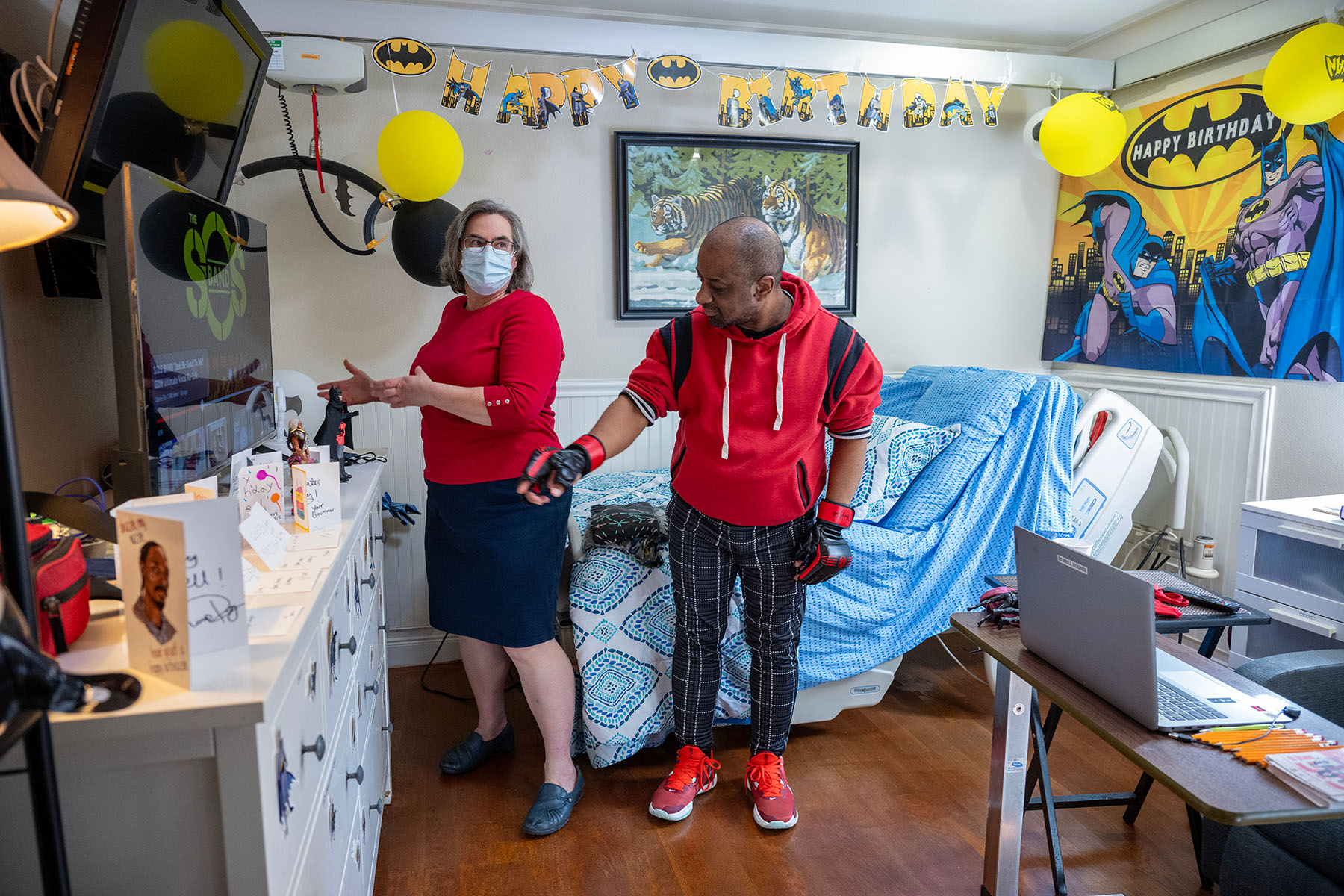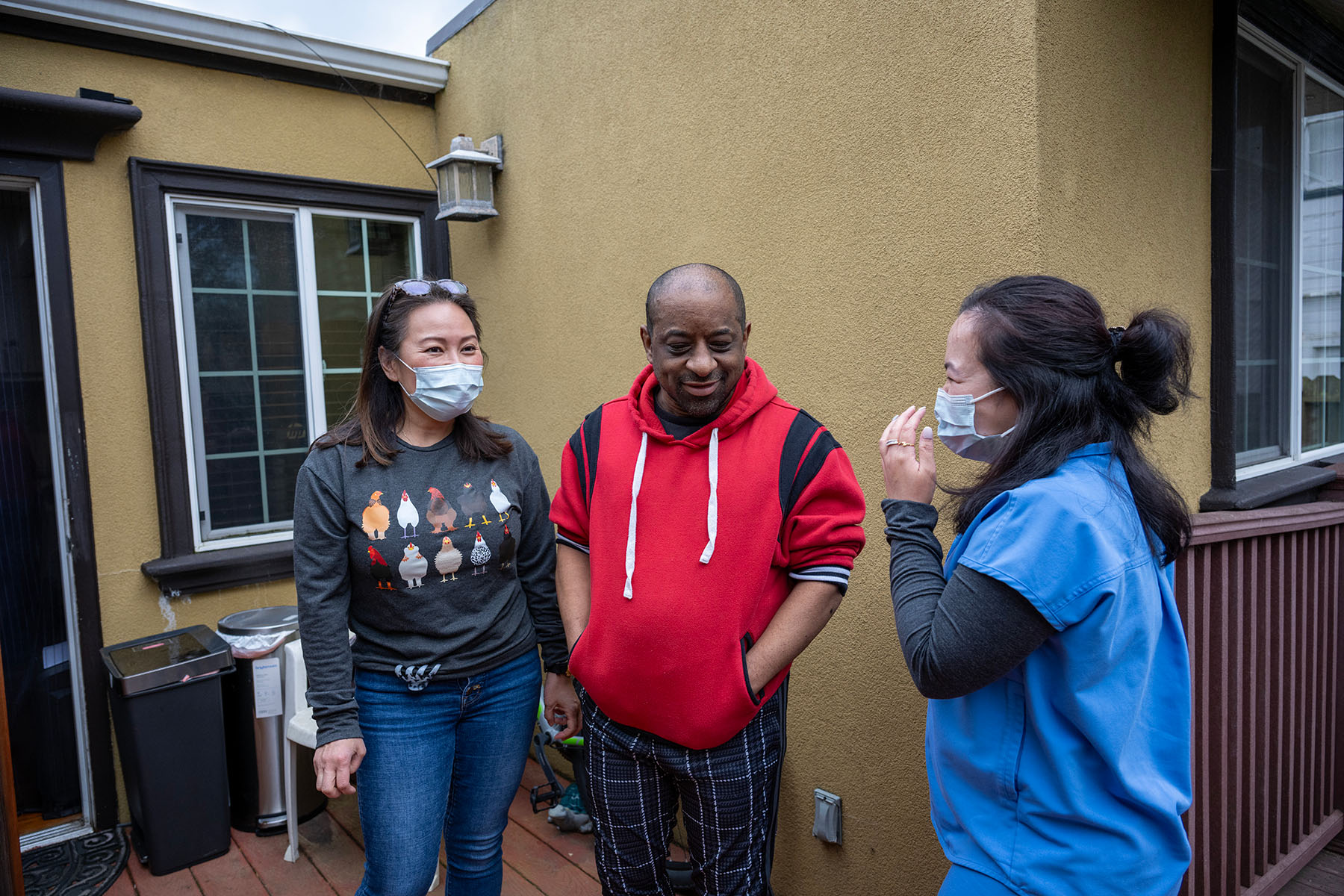Russell Hughes and his sister Sylvia have been close since their childhood in the Bayview Hunters Point neighborhood of San Francisco. He protected her in school, and she made sure he took insulin for his Type 1 diabetes. As adults, they lived together after their parents died and the family home was sold.
Then money got tight and the siblings were evicted. Placed in a different shelter from her brother and with a new baby to look after, Sylvia couldn't keep a close eye on Russell, who has an intellectual disability.
"He would forget to take his medicine, and he'd eat bad food," Sylvia recalled. "One day, the shelter kicked him out because they thought he was on drugs, but actually he was going into a diabetic coma."
I kept getting sick, passing out, throwing up. Back and forth to the hospital all the time.
Sylvia and other relatives found Russell collapsed in the street that day and called an ambulance. He bounced in and out of hospitals for years after, staying at a boarding house and then a skilled nursing facility.
"I kept getting sick, passing out, throwing up," Russell said. "Back and forth to the hospital all the time."
In March 2022, everything changed. His family found and got Russell placed in a small group home in San Francisco's Ingleside neighborhood with three other adults with intellectual and developmental disabilities (IDD). The house has a nurse and other staff present 24 hours a day, and a UCSF doctor, Clarissa Kripke, MD, who visits regularly. Russell's blood sugar is now stable, and he hasn't been to the hospital in two years.
"To have people who can keep a close eye on Russell, encourage him to eat better and get exercise and do things with others - it has made all the difference," Sylvia said. "If he weren't there, I think he'd be dead by now."
Centering the patient
On any given day, you'll find Russell decked out in pro-wrestling gear - shorts, hoodie and red gloves that flash through the air as he demonstrates his moves.
"This is why I have to keep my blood sugar down," he said. "If I want to wrestle, I have to stay in good shape."
Russell's improved health is a testament to an approach that centers the patient by considering their quality of life as well as their medical needs, said Kripke, who directs the UCSF Office of Developmental Primary Care.
"In smaller group homes, the staff get to know the residents better, and they can be more attentive to changes and red flags," said Kripke. "The patients have more agency and control. All of that is good for mental and physical health."


Unfortunately, this type of care is rare for the half million adults in California with IDDs, about 13,000 of whom live in San Francisco. It requires health care providers who are knowledgeable about how to care for patients with IDD; health care systems willing to change how and where they provide care; and insurers willing to pay for costs that may be higher up front but yield savings in fewer hospital and clinic visits later.
Kripke realized early in her career that the typical 15-minute office visit didn't work well for learning about the needs of a complex patient with IDD. Going to a clinic or medical facility can be a grueling affair for them, involving multiple staff for transport and rushed, stressful interactions, she noted.
"I'd see patients with complex disabilities brought into the clinic by drivers who didn't know them and couldn't tell me what was going on in their day to day," Kripke recalled. "I couldn't take good care of my patients in that environment."
Scaling up good care
In Russell's case, an ongoing challenge for caregivers has been how to encourage limits on eating unhealthy food, while respecting his autonomy.
Part of being a family doctor is becoming what that community needs you to be.
"Part of my job is to make sure Russell has healthy, high-protein options in the pantry," said his nurse Marjorie Ongpauco, RN, CDDN. "Also, I'm there in the middle of the night when he wants to snack on junk food, so we can talk about making a good choice. But he has the freedom to decide what to do."
In 1999, Kripke started looking for alternative ways to care for patients with IDD. She learned that a few UCSF doctors took care of such patients in group homes, but they were scattered across the Bay Area. So she proposed that she serve as a single hub for UCSF's adult patients with IDD, rounding on them where they lived, talking to the staff, and getting to know the environments and patients more deeply.
It took years to get up and running as a full-time gig, but now Kripke is the "house call" doctor for about 100 patients with disabilities in 25 group homes around the Bay.
"Part of being a family doctor is becoming what that community needs you to be," Kripke said. "UCSF allows you to be innovative in enacting this."
You get what you pay for
Kripke's payment model is to charge every patient's group home or insurer a flat monthly fee, rather than bill for every test or "unit of care." She also keeps her census far lower than most physicians, who see about 1,000 patients.
The group homes are glad to pay Kripke for her care, although they could opt to have residents treated at local clinics for free. That's because the benefits are so clear, said Maria Jasmin Nelson, RN, the administrator at Russell's home.
"To go from being in and out of the ICU several times a month to going two years without a hospital visit, that's remarkable," Nelson said. "Russell's so much happier now, joking with staff, talking with other residents, getting up every day to go to his day program. What Dr. Kripke is doing here is a miracle."






